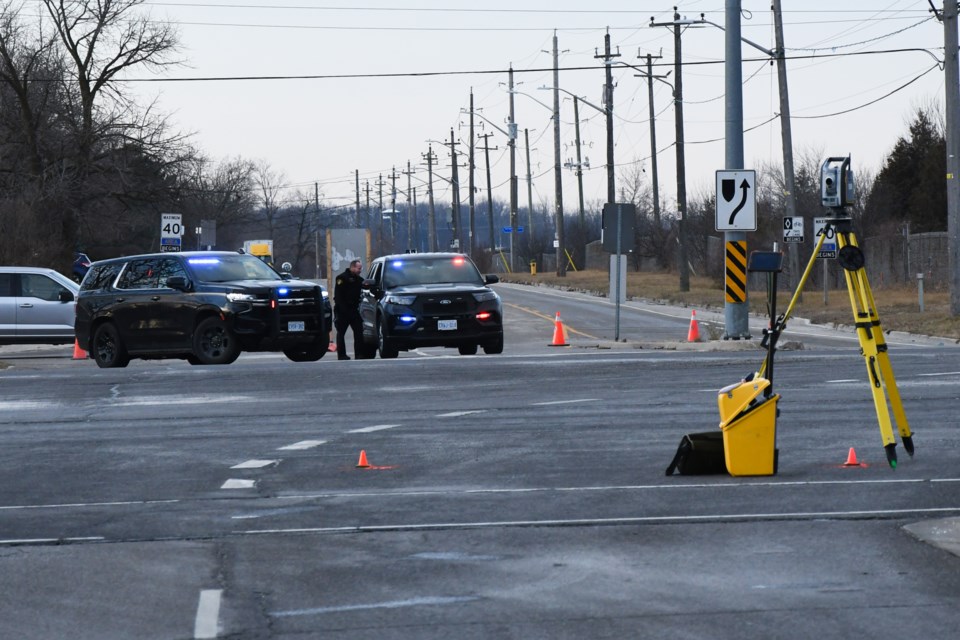The local coroner who confiscated camera equipment from a GuelphToday reporter at the scene of a fatal crash in December did nothing wrong, the provincial coroner's office says following an internal investigation.
That investigation did not include speaking with the reporter in question.
A second complaint filed with the OPP regarding an officer's conduct at the scene, specifically the detainment of reporter Richard Vivian, is ongoing.
On Dec. 20 Vivian attended an incident at the intersection of the Hanlon Expressway and College Avenue, where a vehicle had struck and killed a pedestrian nearly three hours before the reporter's arrival.
Vivian was confronted by an OPP officer on scene who had issues with where Vivian was standing – on the sidewalk, where several pedestrians walked through the area – and that he was doing his job taking photos of the scene. The officer detained Vivian and confiscated his camera. After a discussion with the coroner on scene, Dr. Paul Mendonca, the camera was returned to Vivian but the SD card inside it was confiscated. It was returned the next day.
GuelphToday filed a complaint claiming there was no need to confiscate Vivian's equipment and that the coroner did so at the request of the OPP officer, who was agitated by Vivian's presence.
Chief Coroner of Ontario Dr. Dirk Huyer had Deputy Chief Coroner Bonnie Burke conduct an investigation, speaking with Mendonca, the regional supervising coroner and others in "upper management."
At no point did Burke speak with Vivian or GuelphToday editor Tony Saxon, who filed the complaint, as part of the investigation.
"Dr. Burke has determined that the intentions of the investigating coroner and the RSC were able to collect evidence and ascertain the facts in a timely manner, and they made their decisions based on a rapidly changing environment and the concern that critical evidence would be lost," Huyer wrote in his decision.
"The decision to seize the SD card was informed by multiple factors including (but not limited to), the unexpected delayed attendance of OPP Scene of Crime Officers responsible for taking photographs for the coroner, the on-going [sic] closure of a busy intersection and the need for the coroner and the pathologist to understand the scene and the angles of the collision."
The Coroner's Act allows coroners to confiscate any material they believe is relevant as evidence to the investigation and ruled in this case the coroner believed the SD card did, without explaining why or how.
GuelphToday's complaint argued that the coroner was acting at the request of the upset OPP officer and had no intention or need to confiscate the equipment for his professional purpose.
Photos on the confiscated SD card show that OPP investigators were already on scene and their cameras were set up at the time.
Huyer said the coroner acted within the authority granted him under the Coroner's Act.
"The seizure of a member of the media's photographs is a rare event and I recognize the important role the media plays in informing the public of the circumstances of a death. I hope we can continue to work together to improve the health and public safety of Ontarians," Huyer's decision said.
Vivian and Saxon have a combined 60 years in the news gathering business and have covered countless serious and several fatal incidents. Neither have ever had equipment confiscated.
After receiving the decision via email, GuelphToday reached out to the coroner's office with several questions, including why was the reporter in question not interviewed as part of the investigation and what, if any, is the appeal process for the decision. They have not yet responded.
GuelphToday's complaint with the OPP is currently being reviewed by a civilian investigator with the Professional Standards Unit who will determine whether a formal unprofessional conduct charge against the officer is warranted. That decision is not expected until mid-summer.
GuelphToday was offered an informal resolution process, but that was declined because they were told that at no point in that process would it be officially determined if that the officer's conduct was wrong. Also, an informal resolution process would be confidential, something else GuelphToday did not agree with.
"What we are seeking is official acknowledgement that Richard Vivian did nothing wrong that day. He was simply doing his job in a professional manner and the officer had no right to detain him and the coroner had no basis to confiscate his professional," said Saxon. "He was simply doing his job in a professional manner.
"Most confusing is how a proper investigation can be conducted without interviewing the person who is at the centre of it?"
An audio recording of the interaction with the officer exists as Vivian was on the phone with Saxon at the time. The officer can clearly be heard expressing his displeasure.
"The Coroner's decision is inherently contradictory. On one hand, it expresses a profound respect for the work of journalists and the freedom of the press. On the other hand, it justifies the intentions and actions that lead up to the seizure of a reporter's SD card because it helped law enforcement in doing their jobs. Journalists are not agents of the police; we must always be independent and public authorities must respect the rights afforded to journalists to report matters in the public interest," said Bent Jolly, president of the Canadian Association of Journalists.
"Hearing that the investigation never contacted Richard Vivian, the reporter involved in the seizure, to understand his version of events is extremely puzzling and does little to instill confidence in results of the investigation. Rather than finding answers to why an egregious press freedom violation took place, the letter comes off as a perfunctory effort to paper over, and explain away, any wrongdoing."
Jolly said he is left "unsatisfied" that any lessons have been learned and any actions will be taken to ensure this doesn't happen again in the future.
